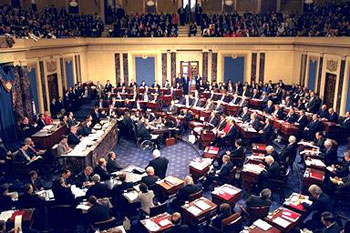 Next Monday, Senate Banking Chair Chris Dodd (D-CT) will introduce his financial reform bill without Republican support, despite pledges of Senators Richard Shelby (R-AL) and Bob Corker (R-TN) to work with him. Our recent worst financial crisis since the Depression cries out for major changes, but our broken government may fail to enact them. Absent public outcry, heavily financed industry lobbying will gun down financial reform in the Senate this spring.
Next Monday, Senate Banking Chair Chris Dodd (D-CT) will introduce his financial reform bill without Republican support, despite pledges of Senators Richard Shelby (R-AL) and Bob Corker (R-TN) to work with him. Our recent worst financial crisis since the Depression cries out for major changes, but our broken government may fail to enact them. Absent public outcry, heavily financed industry lobbying will gun down financial reform in the Senate this spring.
Why?
Consumer Financial Protection Agency — Give it too much independence and authority, and it might stop financial predation of consumers, or it might stop financial innovation. Which is it? It all depends on where you sit. Obviously too many people of insufficient means became homeowners, at least seven million of whom have or will face foreclosure. Were they speculators who deserve what’s coming, or were they taken advantage of by mortgage companies gobbling up quick profits by selling the American dream without asking too many questions? Housing a CFPA within the Fed or the FDIC or Treasury would be in direct conflict with their duties to regulate banks. It would be like putting the district attorney in charge of public defenders. An independent CFPA could damage the industry and probably would, until it was captured by the industry like most other Washington regulatory bodies. I would note that we demand lots of consumer protection for cars, drugs, food, and baby strollers, but comparatively little when it comes to new financial products.
Derivatives — Exchange trading of standardized products and increased transparency sounds good until you start talking with end users of jet fuel, agricultural products, metals, etc., who had nothing to do with causing the financial crisis, but who will incur increased costs. Any exceptions you make for end users will eventually be broadened by Congress to gut these protections and would lead to the next financial crisis.
Too Big To Fail — At least there’s some bipartisan agreement here. Set up a council of regulators with clear authority to take apart large financial institutions of any kind. Increase capital requirements, and put limits on leverage. However, the Administration would go one step further and leave some Senate Democrats and most Senate Republicans behind by imposing a tax on institutions with assets over $50 billion of 0.15% of their liabilities. The idea is to tax risk and use the proceeds to repay the taxpayers for TARP. This populist appeal runs into problems when you start looking at who would pay and how responsible they were for this financial crisis or might for the next one. Most of the bad actors are gone already. If similar taxes aren’t imposed on other world financial centers, our affected institutions would labor at a competitive disadvantage or shift operations and jobs overseas.
These issues are not easily resolved, but that doesn’t mean we should stand by and watch financial reform get gunned down in the Senate. Our kids are going to have plenty of our debts to pay for without leaving them unprotected against the next financial crisis.
- Bulenox: Get 45% to 91% OFF ... Use Discount Code: UNO
- Risk Our Money Not Yours | Get 50% to 90% OFF ... Use Discount Code: MMBVBKSM
Disclaimer: This page contains affiliate links. If you choose to make a purchase after clicking a link, we may receive a commission at no additional cost to you. Thank you for your support!


Leave a Reply